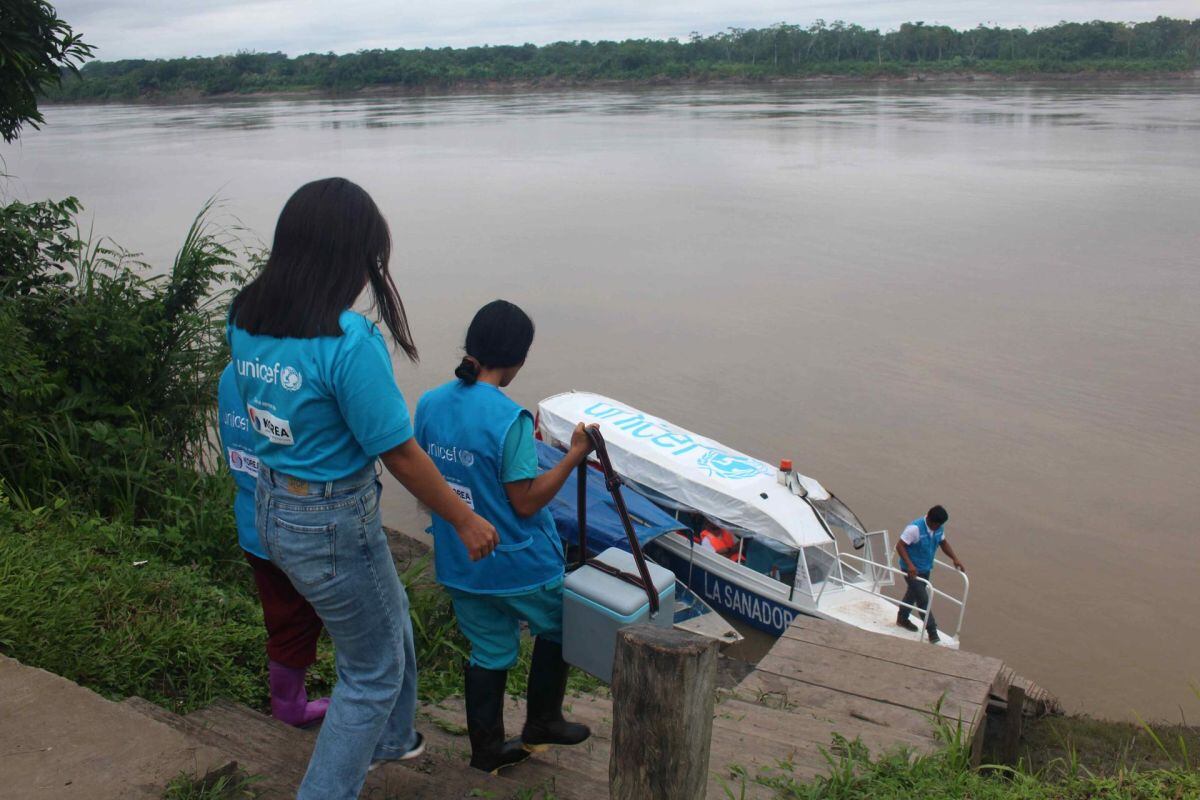
It’s still night, but in a remote river port in the Peruvian Amazone, A white boat starts its engine and, after hours of crossing, arrives at an indigenous community. Throughout the day, the nurses on board will vaccinate the children and take care of the condition of the pregnant women who do not have access to health services.
Nicknamed ‘The healer’, This simple boat travels the Marañón River and its winding tributaries to provide health care to dispersed towns in the province of Datem del Marañón, in the department of Loreto.
The early morning mist is still trapped in the trees that border the river waters and, on the way to the first destination, nurses Delcy Villalobos and Blanca Guerra stop at a modest wooden health post to delicately collect vaccines that they will later administer. to the kids.
After an hour and a half of travel, the boat arrives at San Juan de Sasipahua, an indigenous Shawi community that speaks the language of the same name and where half of its population are children.
The first step of the health brigade commanded by Unicef is to meet with the community leader or ‘apu’, and, once they report their mission and receive their permission, “they are looking for mommies”, vThey visit every house that houses minors and pregnant women.
Loreto’s numerous but dispersed communities accumulate some of the worst child health data in the country: the 58.1% of children under 3 years of age suffer from anemia, the vaccination rate is one of the lowest in the country and there is a high incidence of acute diarrheal diseases.
“This population is very far from health centres and the cost of travelling from these communities to the centres is very high. It is often difficult for them to afford this.”
“So, we were thinking about a solution and one of these was ‘The healer’, which has made it possible to navigate rivers and reach these most remote communities”UNICEF health and nutrition officer Carlos Albrecht tells EFE from San Juan de Sasipahua.
First beat
One of the brigade’s first stops in the community is a visit to a young woman who is 16 weeks into her second pregnancy. Thanks to the presence of obstetrician Guerra, she has been able to hear her baby’s heartbeat for the first time.
“We arrive in the community, where the pregnant woman does not have any control, she does not have a laboratory test and we provide care, the first control. We bring the cards, we bring medicine, in this case, at 14 weeks it is folic acid and after 14 weeks it is sulfate, and after 20 weeks it is calcium.“, Explain.
The typical wooden plank house built high through whose cracks you can see the chickens pecking, welcomed the powerful sound of the baby’s heartbeat and numerous Guerra tips on nutrition during pregnancy.
At the same time, in a small patio surrounded by vegetation, Villalobos talks with Lía, a five-year-old girl who is going to receive the pneumococcus vaccine and the DPT booster, a mixture that immunizes against diphtheria, Bordetella pertussis and tetanus.
After a brief cry that consoles her mother, the nurse fills out her vaccination card, up to date thanks to these brigades.
“When a brigade arrives in a community, one of the services it provides is immunization, something that UNICEF cares about a lot. We are very attentive to vaccinations, but it is also important to carry out growth and development checks, where the child has to be weighed and measured.”says Albrecht.
He adds that these controls carried out by nurses during visits are key to ensuring that the child is growing appropriately according to his age and to verify if he is suffering from malnutrition or is at risk of doing so, and if so, supplements are administered. and corresponding medication.
Unicef and Adra, the organization’s implementing partner, point out that many communities like this one, of about 200 people, lack health services, and for parents to carry out vaccination or prenatal check-ups, they have to travel long distances by boat. which represent a cost for families with few economic possibilities.
This causes many children whose vaccination schedule is incomplete, minors with undiagnosed and untreated diseases and, ultimately, cases of maternal mortality that could have been avoided with medical care.
And ‘The Healer’, which began setting sail in February 2024, has already generated such a positive impact that thanks to the project it has multiplied and there are four that will continue to bring health to the children of the Peruvian Amazon.
It may interest you
- They create a working group on river and tourist water transport in the Peruvian Amazon: what is it about?
- Sefor: More than 70% of forest fires occurred in the Peruvian Amazon
- Executive board created to give economic and environmental boost to the Amazon
Source: Gestion
Ricardo is a renowned author and journalist, known for his exceptional writing on top-news stories. He currently works as a writer at the 247 News Agency, where he is known for his ability to deliver breaking news and insightful analysis on the most pressing issues of the day.












